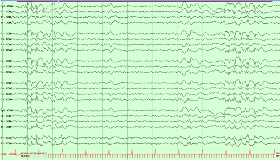A Novel Genetic Variant in the NDUFV1 Gene Presenting in Siblings With Mitochondrial Complex I Deficiency
Abstract number :
3.396
Submission category :
12. Genetics / 12A. Human Studies
Year :
2018
Submission ID :
502653
Source :
www.aesnet.org
Presentation date :
12/3/2018 1:55:12 PM
Published date :
Nov 5, 2018, 18:00 PM
Authors :
Paul Motika, Oregon Health and Science University and Wojciech Wiszniewski, Oregon Health and Science University
Rationale: Mitochondrial Complex I deficiencies are on of the inherited mitochondrial disorders, presenting with a variety of phenotypes. Inheritance is variable, and mutations have been described in genes in nuclear and mitochondrial DNA. NDUFV1 is a nuclear gene known to encode a subunit in complex I of the mitochondrial respiratory chain. We report two previously undescribed NDUFV1 variants detected in siblings demonstrating similar clinical phenotypes. Methods: Sibling one presented with delayed developmental milestones. He had a seizure in the first year of life and no further seizures until age 18, when he began experiencing generalized tonic-clonic, myoclonic, and atonic seizures. Evaluation included elevated serum and CSF alanine levels, and normal serum lactate, carnitine, very long chain fatty acids, phytanic acids, metabolic screens, and urine organic acids. Exam revealed retinitis pigmentosa and optic nerve pallor, abnormal electroretinogram and visual evoked potentials, and early cataracts. He had difficulties with fine motor control and upper extremity tremor. EEG showed generalized slowing. Muscle biopsy was suggestive of mitochondrial myopathy, with muscle fibers showing subsarcolemmal basophilic granules and red granularity, and subsarcolemmal staining with succinic dehydrogenase, NADH, and cytochrome oxidase. Transmission electron microscopy revealed heterogeneous mitochondria with whorled cristae, and intramitochondrial inclusions. There was marked deficiency of complex I activity. Over time, he had gradual progression of clinical symptoms. Sibling 2 presented similarly with complex partial seizures at age 22. EEG showed generalized 5-6 Hz polyspike and wave activity, potentiated by photic stimulation. He had upper extremity tremor and proximal greater than distal muscle weakness. Visual exam revealed pigmentary retinal dystrophy and abnormal ERG. Cardiac evaluation revealed Wolff-Parkinson-White syndrome. He underwent muscle biopsy in 1998, which revealed a small number of ragged red fibers in trichrome stain, as well as subsarcolemmal crescents on NADH and SDH stains. There was also deficiency of complex I activity. Over the years, sibling 2 also had slow progression of symptoms, as well as multifocal strokes on MRI. Results: Sibling 1 and 2 underwent genetic testing in 2017 utilizing combined whole exome mitochondrial genome plus mitochondrial nuclear gene panel [GeneDx; Gaithersburg, MD]. They were found to be heterozygous for two variants (R15W and T124I) of unknown significance (VUS) in the NDUFV1 gene (C.43 C>T and c.371 C>T). Autosomal recessive mitochondrial complex 1 deficiency is associated with pathogenic variants in this gene. The father (unaffected) subsequently underwent targeted evaluation and was found to have one of the two variants (R15W), consistent with being a heterozygous carrier. The mother (unaffected) also underwent targeted evaluation for the R15W and T124I variants in NDUFV1 and was found to be heterozygous for the other identified variant (T124I). Conclusions: NDUFV1 is a nuclear gene known to encode a subunit in complex I of the mitochondrial respiratory chain. Several genetic variants in NDUFV1 have been associated with complex I mitochondrial disorders. To our knowledge, the T124I variant has not been published as a pathogenic or benign variant. We report two siblings with similar phenotypic presentations of mitochondrial complex I deficiency, both heterozygous for NDUFV1 variants (R15W and T124I). These findings suggest that these variants may be associated with the clinical presentation described, and that heterozygous variants in NDUFV1 may be an important contributor to inherited mitochondrial complex I deficiencies. Funding: None

.tmb-.png?Culture=en&sfvrsn=5686ab11_0)